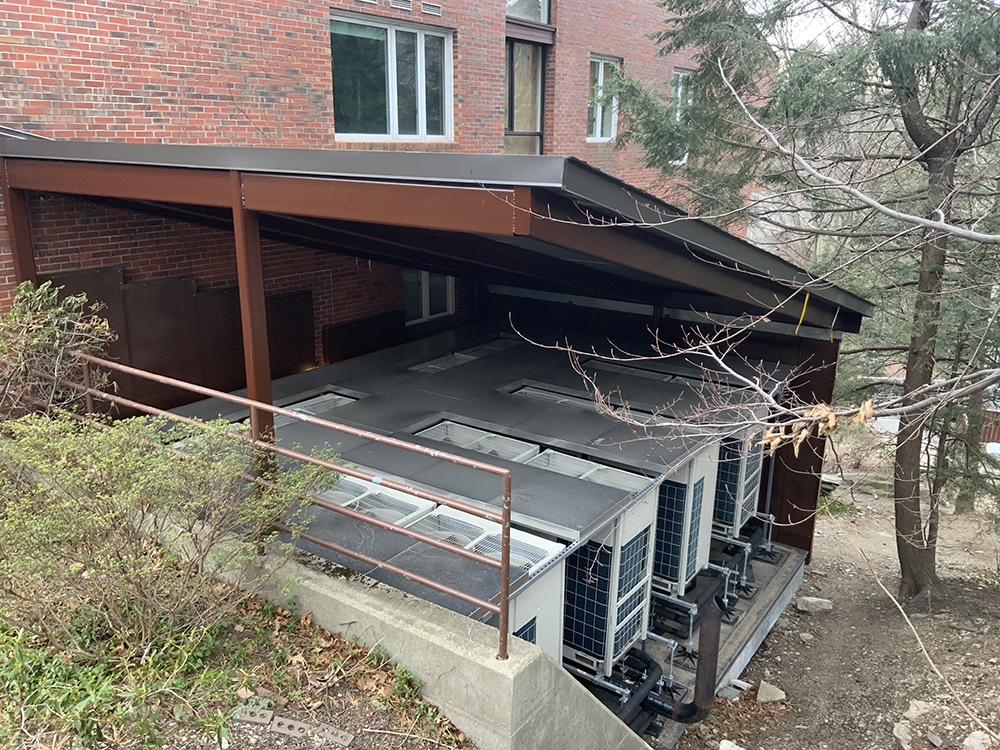Nauset completes critical building upgrades as COVID-19 persists
Boston, MA When the pandemic first hit last year, life as we knew it was brought to a near standstill. Stay-at-home orders, businesses adopting work-from-home models, schools shifting to virtual learning, and restaurants and retailers closing their doors disrupted nearly every aspect of day-to-day living, as much of the population took necessary precautions to avoid contracting and spreading the coronavirus.
As more was learned about how to safeguard against COVID-19, restrictions for “non-essential” activities eased, and in late May, governor Baker lifted the ban on construction. While outdoor ground-up projects were able to proceed relatively quickly by incorporating masks, social distancing, hand-washing and other required COVID-19 safety protocols, work on interior projects – particularly those within occupied and operational residential communities – presented far more complex challenges. Nauset Construction was involved in several projects of this type, performing various building improvements including critical HVAC upgrades that helped to improve the air quality for building occupants.
One of these projects was a pair of condominium buildings within Cabot Estate Condominium. Originally built in the 1980’s, the aging HVAC system was overdue for modernization. The condo association selected an energy-efficient, Daikin HVAC system, complete with an app that allows residents to access heating and cooling controls within their unit via a tablet or smartphone. Work included the removal of existing heat pumps and the installation of new systems, including concrete pads, transformers, and steel housing for the HVAC units, as well as specialty sound attenuation systems designed to reduce the transmission of sound generated by the compressors. The systems were also enclosed with decorative fencing for aesthetic purposes.
The interior work presented the real coordination challenge. Working in occupied environments, whether in residential or commercial buildings, always requires additional safety protocols as well as practices designed to minimize disruption to building occupants and commercial activity. During the pandemic, however, those protocols took on an added level of importance to ensure the safety and well-being of the residents, staff, and construction personnel. Nauset implemented comprehensive safety protocol guidelines published by the State of Massachusetts, Center for Disease Control, Occupational Safety & Health Administration, and the City of Boston.
The interior work required access to each of the 48 condominiums in order to replace the control panels located in the utility closets of each unit. Construction also included upgrades to the common areas, as acoustical ceilings with recessed LED lights were installed throughout the corridors of the buildings, and additional energy efficient lighting upgrades were added to existing fixtures above the individual unit doorways. Since the installation of the new compressors and HVAC units required the old system to be completely shut down, a temporary cooling tower was utilized to provide conditioned air in each unit while the existing system was taken down and new compressors and HVAC units were brought on-line. Each compressor services 4-5 units and had to remain shut down until each individual unit was tied in, tested, and fired up.
Further compounding the COVID-19 safety challenges was the relative age of the condominium owners, which skews to an older – and therefore more vulnerable – demographic. This extra sensitive working environment made Nauset’s strict adherence to COVID-19 safety measures mission-critical and key to the projects’ overall success. In addition to a third-party safety consultant, Nauset employed a dedicated full-time COVID-19 site safety officer whose sole responsibility was to monitor the project site for safety compliance including sanitizing work areas, enforcing the donning of masks and other PPE, and social distancing. Access to the individual units was coordinated and prescheduled on a per unit basis through the owner’s property manager, Dannin Management Corporation, making communication and agility key team attributes to successfully achieve the compressed project schedule. While working within residential units or common areas, workers installed ZipWall plastic barriers typically used as dust barriers for interior construction to partition work areas off from occupied spaces. The ZipWalls also doubled as a preventative barrier to reduce the possible transmission of COVID-19. During the project there were no reported cases of COVID-19 among Nauset employees or its subcontracting partners.
Working in occupied settings, particularly during a pandemic, presents a unique set of construction challenges. However, maintaining a heightened awareness and implementation of proper safety protocols can go a long way to help ensure a safe environment.
Nobis Group awards Robinson and Moreira STEM scholarships


The rise of incubators and co-working spaces: The latest in life sciences - by Matt Combs

Careers in Construction Month focus on training and safety - by Joe Camilo

The design-build advantage: Integrated interior design solutions - by Parker Snyder








.png)